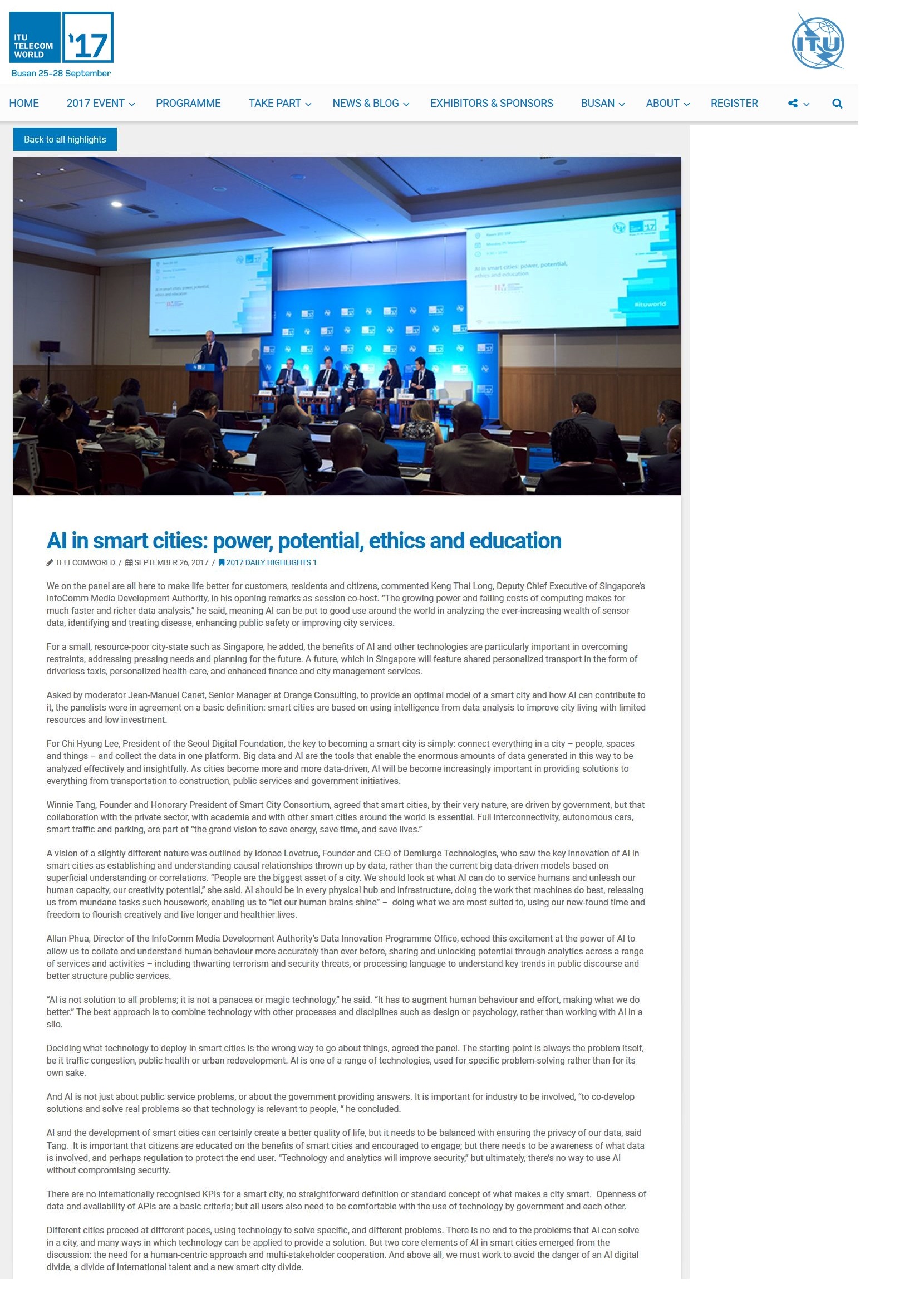網上版請按此

AI in smart cities: power, potential, ethics and education
We on the panel are all here to make life better for customers, residents and citizens, commented Keng Thai Long, Deputy Chief Executive of Singapore's InfoComm Media Development Authority, in his opening remarks as session co-host. "The growing power and falling costs of computing makes for much faster and richer data analysis," he said, meaning AI can be put to good use around the world in analyzing the ever-increasing wealth of sensor data, identifying and treating disease, enhancing public safety or improving city services.
For a small, resource-poor city-state such as Singapore, he added, the benefits of AI and other technologies are particularly important in overcoming restraints, addressing pressing needs and planning for the future. A future, which in Singapore will feature shared personalized transport in the form of driverless taxis, personalized health care, and enhanced finance and city management services.
Asked by moderator Jean-Manuel Canet, Senior Manager at Orange Consulting, to provide an optimal model of a smart city and how AI can contribute to it, the panelists were in agreement on a basic definition: smart cities are based on using intelligence from data analysis to improve city living with limited resources and low investment.
For Chi Hyung Lee, President of the Seoul Digital Foundation, the key to becoming a smart city is simply: connect everything in a city – people, spaces and things – and collect the data in one platform. Big data and AI are the tools that enable the enormous amounts of data generated in this way to be analyzed effectively and insightfully. As cities become more and more data-driven, AI will be become increasingly important in providing solutions to everything from transportation to construction, public services and government initiatives.
Winnie Tang, Founder and Honorary President of Smart City Consortium, agreed that smart cities, by their very nature, are driven by government, but that collaboration with the private sector, with academia and with other smart cities around the world is essential. Full interconnectivity, autonomous cars, smart traffic and parking, are part of "the grand vision to save energy, save time, and save lives."
A vision of a slightly different nature was outlined by Idonae Lovetrue, Founder and CEO of Demiurge Technologies, who saw the key innovation of AI in smart cities as establishing and understanding causal relationships thrown up by data, rather than the current big data-driven models based on superficial understanding or correlations. "People are the biggest asset of a city. We should look at what AI can do to service humans and unleash our human capacity, our creativity potential," she said. AI should be in every physical hub and infrastructure, doing the work that machines do best, releasing us from mundane tasks such housework, enabling us to “let our human brains shine" – doing what we are most suited to, using our new-found time and freedom to flourish creatively and live longer and healthier lives.
Allan Phua, Director of the InfoComm Media Development Authority's Data Innovation Programme Office, echoed this excitement at the power of AI to allow us to collate and understand human behaviour more accurately than ever before, sharing and unlocking potential through analytics across a range of services and activities – including thwarting terrorism and security threats, or processing language to understand key trends in public discourse and better structure public services.
"AI is not solution to all problems; it is not a panacea or magic technology," he said. "It has to augment human behaviour and effort, making what we do better." The best approach is to combine technology with other processes and disciplines such as design or psychology, rather than working with AI in a silo.
Deciding what technology to deploy in smart cities is the wrong way to go about things, agreed the panel. The starting point is always the problem itself, be it traffic congestion, public health or urban redevelopment. AI is one of a range of technologies, used for specific problem-solving rather than for its own sake.
And AI is not just about public service problems, or about the government providing answers. It is important for industry to be involved, "to co-develop solutions and solve real problems so that technology is relevant to people," he concluded.
AI and the development of smart cities can certainly create a better quality of life, but it needs to be balanced with ensuring the privacy of our data, said Tang. It is important that citizens are educated on the benefits of smart cities and encouraged to engage; but there needs to be awareness of what data is involved, and perhaps regulation to protect the end user. "Technology and analytics will improve security," but ultimately, there's no way to use AI without compromising security.
There are no internationally recognised KPIs for a smart city, no straightforward definition or standard concept of what makes a city smart. Openness of data and availability of APIs are a basic criteria; but all users also need to be comfortable with the use of technology by government and each other.
Different cities proceed at different paces, using technology to solve specific, and different problems. There is no end to the problems that AI can solve in a city, and many ways in which technology can be applied to provide a solution. But two core elements of AI in smart cities emerged from the discussion: the need for a human-centric approach and multi-stakeholder cooperation. And above all, we must work to avoid the danger of an AI digital divide, a divide of international talent and a new smart city divide.